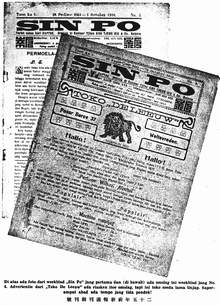Sin Po (newspaper)
Sin Po (Mandarin: 新报 Pīnyīn: Xīn bào, literally New Newspaper) was a Peranakan Chinese Malay-language newspaper published in the Dutch East Indies and later Indonesia. It expressed the viewpoint of Chinese nationalism and defended the interests of Chinese Indonesians and was for several decades one of the most widely read Malay newspapers in the Indies. It existed under various names until 1965.
| Type | Weekly newspaper (1910-1912) Daily newspaper (1912-1965) |
|---|---|
| Format | Broadsheet |
| Founder(s) | Lauw Giok Lan and Yoe Sin Gie |
| Founded | October 1, 1910 |
| Political alignment | pro-Nationalist, pro-Chinese |
| Language | Indonesian |
| Ceased publication | 1942 (first) October 1, 1965 (second and final) |
| Relaunched | 1946 (second) |
| Headquarters | Jakarta |
| Country | Dutch East Indies Indonesia |
History
The paper was founded in Batavia on October 1, 1910 after Lauw Giok Lan came up with the concept and approached Yoe Sin Gie. At first Lauw took on the editorial duties and Yoe took on the administrative aspects.[1] The first director of the paper was Hauw Tek Kong. The paper quickly became very successful. Originally the paper had a European head editor, J. R. Razoux Kuhr, because the higher legal status of Europeans made this standard practice in Malay newspapers of the time.[2] Only in 1916 did the paper decide to replace Razoux Kuth with a Chinese head editor, Kwee Hing Tjiat. By 1917 the paper took on an aggressively Chinese nationalist line. Although it was a paper run by Peranakan Chinese, it came to take a very pro-Peking and pro-Totok Chinese position, harshly criticizing the Chinese Officer system of Dutch indirect rule over the Indies Chinese.[3] Historian Leo Suryadinata notes that Sin Po came to lead a distinct group at this time which he terms the Sin Po group. He states that this group believed in Peranakan-Totok unity, Chinese language education among Peranakan and non-participation in local Indies politics.[4]

In 1922 Ang Jan Goan joined the editorial board of the newspaper. When Tjoe Bou San died in 1925, Kwee Kek Beng became editor-in-chief while Ang Jan Goan was promoted to be directorr, a position he stayed in until the end of the publication in 1959.[5]
By the second half of the 1920s, with the Indonesian nationalist movement gaining strength, Sin Po moderated its pro-China line and became more sympathetic to the Indonesian perspective.[3] The group they represented also shifted in this direction as the editors of Djawa Tengah in Semarang become more Indies-oriented. Many of the Sin Po group who had advocated that Peranakan Chinese 'go back' to China for work and education gave up on this campaign.[4]
In the late 1930s Sin Po shifted its campaigning towards fundraising for China and spreading an anti-Japanese message among the Indies Chinese readership. The paper managed to raise 1.7 million guilders from 1937 to 1942 for the Chinese war effort against Japan.[4]
The paper continued after Indonesian independence and was forced to change its name in 1958 due to government regulations. It became Pantjawarta and then Warta Bhakti. In this era the paper took a pro-PKI line and was therefore banned in the crackdown after the September 30 Movement (G-30-S) in 1965.
The comic Put On was serialized in this newspaper beginning in 1931; its author, Kho Wan Gie, began publishing his comics in it the previous year.[6]
References
- Sin Po Jubileum Nummer 1910–1935 (Djakarta: Sin Po, 1935).
- Sin Po Jubileum Nummer 1910–1935 (Djakarta: Sin Po, 1935).
- Seabad pers kebangsaan: 1907–2007. Agung Dwi Hartanto et al. I:BOEKOE, Yogyakarta, 2008.
- Leo Suryadinata. Peranakan Chinese Politics in Java, 1917–1942. Singapore University Press, 1981.
- Suryadinata, Leo (1995). Prominent Indonesian Chinese : biographical sketches ([3rd.] ed.). Singapore: Institute of Southeast Asian Studies. pp. 3–4. ISBN 9789813055032. Retrieved June 28, 2020.
- Agus Dernawan T. (February 6, 2019). "Kho Wan Gie and Goei Kwat Siong Chinese-Indonesian artists behind legendary comic strips". The Jakarta Post. Retrieved February 14, 2019.